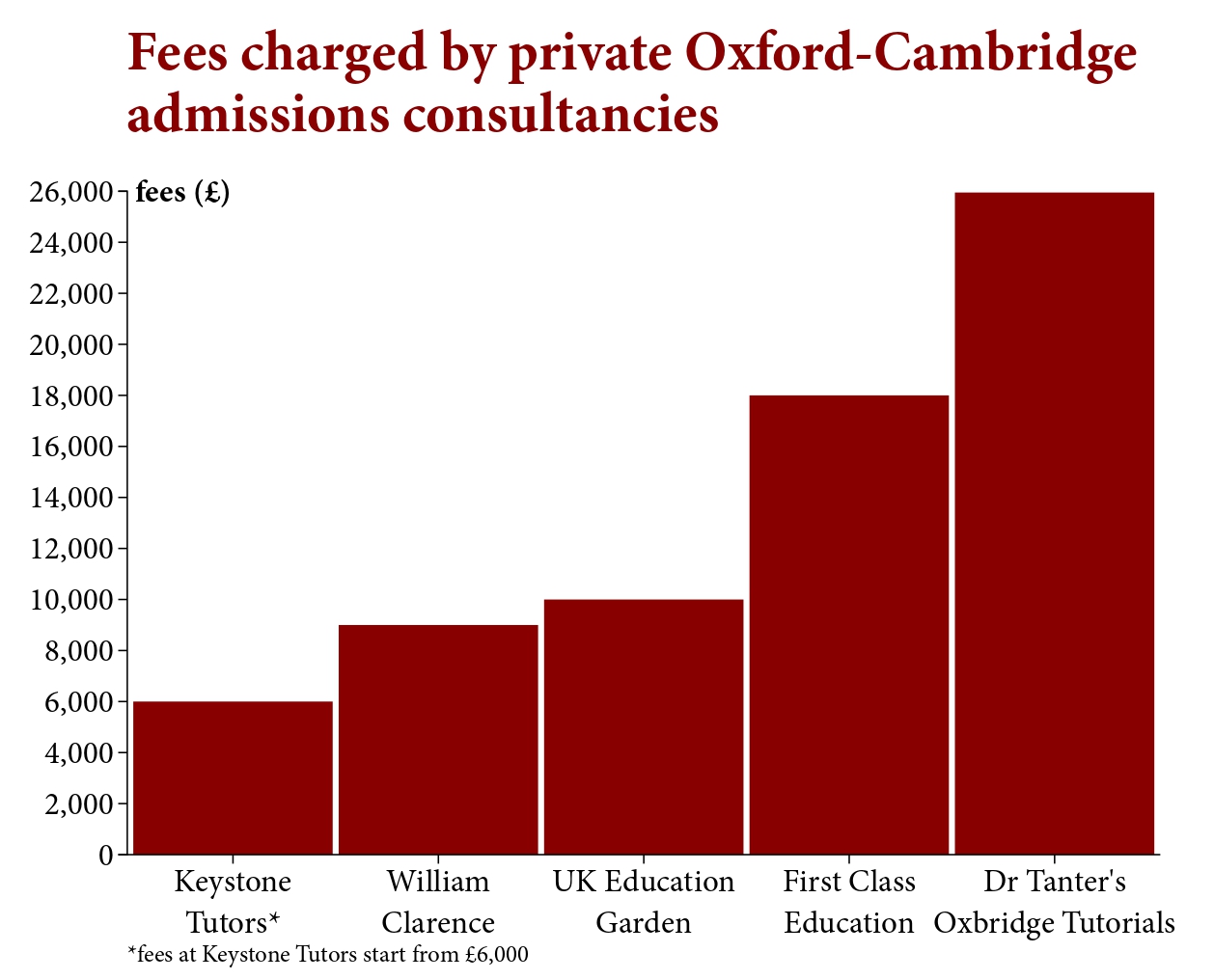For a price that rivals tuition fees, a small but lucrative group of private consultancies promise expert guidance for students applying to Oxford and Cambridge. Bespoke packages costing up to £25,590 offer everything from interview preparation to subject-specific mentoring through the increasingly competitive application process.
The real draw for many, however, is the promise of insider access, with some firms openly advertising direct connections to current tutors who sit on the universities’ admissions panels. To investigate these claims, Cherwell posed as a prospective client and obtained prospectus documents from several companies, revealing their full scope and cost.
Cherwell has found that oversight of these services appears to be almost non-existent. Freedom of Information (FOI) requests to all Oxford undergraduate colleges revealed only two tutors declared paid work with admissions consultancies over the past three academic years.
This tiny number stands in stark contrast to the extensive access firms advertise, with the discrepancy exposing a grey area in accountability. Whether fault lies on the part of companies or colleges, both possibilities undermine confidence in the equity of admissions – one by selling the illusion of access, the other by directly risking the reality of it.
Inside the programmes
Much of the work these firms do has been hidden from public view due to their exclusive nature. But internal prospectuses obtained by Cherwell reveal just how extensive – and expensive – these programmes can be.
Most begin with an initial consultation involving the student and their parents, followed by a long-term plan that can run for over a year. In some cases, companies advise starting this process as early as 14 or 15 years old, framing early preparation as a competitive advantage.
A growing number of firms now operate in the market, with services ranging from preparation for admissions tests, through to mock interviews and even assistance with super-curricular activities.
Dr Tranter’s Oxbridge Tutorials, for example, includes support “with sourcing work experience and other relevant preparation”, as well as a “comprehensive review of the full UCAS application, with ongoing feedback and support throughout the process”. Another firm, First Class Education, offers weekly one-to-one tutorials and termly strategic reviews with parents, while also covering personal statement drafting and mock interviews.
One parent told Cherwell she turned to a private consultancy after her son’s state school – rated “inadequate” by Ofsted – provided no support for his Cambridge application. She said the “several thousand pound” programme “helped him improve his personal statement and he had about six mock interviews”. Reflecting on the process, she said: “To be honest, they were amazing – he got a place and has just graduated with a high 2:1.”
Not everyone views the industry as a benign force, however. One former tutor who has previously worked for elite firms told Cherwell: “The fees these firms charge are neither reasonable nor justified by the quality of the service provided. Much of their material is produced by students who lack teaching credentials and are inadequately compensated, which undermines the quality of their work.”
Firms repeatedly invoke the idea of ‘insider knowledge’, usually coming from tutors who are Oxbridge graduates. Some firms, however, go further, with Dr Tranter’s explicitly promising access to tutors who currently sit on Oxford and Cambridge admissions panels – the very bodies that decide which applicants receive offers each year. Cherwell contacted Dr Tranter’s for comment, but the firm did not respond to requests for comment.
Claims of disproportionate success rates are also prevalent, with First Class Education proudly boasting: “100% of our Oxbridge applicants received an interview last year, and 24 out of 50 secured offers.” This equates to an acceptance rate of 48% – over triple the average among all Oxford undergraduate applicants in 2024. The company told Cherwell that these figures came from internal data, but acknowledged they were not independently verified, as “not all clients disclose final outcomes”.
The former tutor said the lack of regulation of the industry allows “some companies to misrepresent their success rates and, in some cases, their tutors’ qualifications”. They added: “Parents are paying thousands for a service that often adds little value, with no professional body to ensure standards or quality assurance.”
Whether through success statistics or promises of exclusive access, these claims capture the image of privileged insight that these firms seek to cultivate. Applicants are offered a potentially crucial advantage unavailable to those unwilling or unable to pay for similar opportunities.
Five-figure packages
This promise of insider guidance comes at a hefty premium, with fees regularly reaching the five-figure mark. In a prospectus document usually reserved for interested families, Dr Tranter’s prices its Gold Tier package at £19,950, with the Elite Tier reaching £25,590. The firm also offers a “6 hour tour of Oxford colleges” for an additional £950.
Internal documents obtained by Cherwell show First Class Education’s Oxford PPE programme is spread over two successive periods. The £8,000 “Phase 1: Profile-Building” stage focuses on developing an applicant’s academic background, while “Phase 2: Application Preparation” comes in at an additional £10,000, covering the full UCAS process, up to and including interviews.
First Class Education told Cherwell that its packages provide “highly tailored, long-term support”, with each student offered “sustained mentorship and skill development rather than short-term tutoring”. They stressed that “no current Oxford or Cambridge admissions officers are employed” by the firm, and that all tutors must “disclose any current university employment” to ensure compliance with conflict of interest policies.
Other firms operate under slightly different models, but command similar fees. Keystone Tutors offers a modular “University Advisory Service”, costing over £6,000. Whilst initially appearing to be a cheaper option, this is tempered by the fact it encourages customers to sign up for additional modules available at rates of up to £177 per hour, depending on the tutors’ experience.
Cherwell found many other such examples of high-cost programmes, including William Clarence (starting at £9,000) and UK Education Garden (from £9,999), as shown in Graph 1, both of whom point to the Oxbridge-specific insights and subject expertise that they provide. Keystone Tutors, William Clarence, and UK Education Garden were all approached for comment.

Taken together, the high fees and the manner in which the programmes are presented create a sense of exclusivity both in the nature of the personalised plans and the promised access. Yet despite these bold claims and premium fees, there is little transparency over how such companies operate, bringing the issues of fairness and conflict into focus.
College oversight
All Oxford colleges maintain formal conflict of interest policies, requiring any staff involved in admissions to declare paid work they have completed that could create either real or perceived conflicts, including in tutoring or consultancy. The policies are intended to ensure that no applicant receives an unfair advantage through personal connections or monetary incentives.
Of the colleges that responded to Cherwell’s FOI request – only Christ Church failed to reply despite repeated attempts to contact them – nearly all reported that there had been no declared involvement with admissions consultancies by tutors.
Hertford College referred to a single private tutoring arrangement, explicitly structured to avoid conflicts, whilst Lincoln College also reported one conflict, though stressed that the candidate in question was not applying to the College, nor for a course that they offer. Both cases demonstrate the lengths to which colleges aim to track even minimal external work.
Most colleges referred to policies that prohibited conflicts relating to pecuniary interests. Exeter College, for instance, warns that situations should be declared if “the assessor … has received remuneration for advice given on Oxford University admissions to any individual or organisation”.
Wadham College, meanwhile, explicitly addresses the potential for commercial tutoring schemes to create conflicts of interest: as their policy states, such programmes grant “privileged access” to applicants, which may conflict “with the College’s stated aim of supporting academically able students, regardless of their background, in applying to Oxford”.
However, the conflict of interest policies of several colleges also apply across the entire university, not just within individual colleges. For instance, Mansfield College specifies that a conflict relating to such paid work should be declared “whether the candidates advised have applied to the College or not”.
In addition to this, Oxford University’s Conflict of Interest Policy requires staff to “recognise and disclose activities that might give rise to actual or perceived conflicts of interest,” highlighting admissions as an area where such conflicts may arise. Cambridge University has a similar policy in place, but did not respond to a request for comment.
The gap between the tiny number of declared conflicts and firms’ advertised practices exposes a serious discrepancy. While companies continue to market “current tutors” as a key selling point, Oxford colleges report almost no such involvement.
Whether this is due to companies overstating their access or tutors providing paid guidance without declaring it, the result is legal and ethical ambiguity in a sector which forms part of the UK’s £7.5 billion tutoring industry.
Minimal regulation, maximum cost
Despite the high fees and the bold marketing claims, the private Oxbridge consultancy market remains almost entirely unregulated. No authority – whether at national or university level – directly oversees the claims these companies make about success rates, tutor credentials, or insider knowledge.
This absence of oversight is not unique to university admissions consultancy, with the broader private tutoring industry also operating with minimal regulation. Firms are governed only by general consumer protection and advertising standards, with the lack of an official regulator leaving a gap in an industry shaping access to elite universities.
The Tutors’ Association (TTA) – the UK’s only professional body for private tutors – told Cherwell that “all tutors and tutoring organisations (including education consultancies and Oxbridge admissions specialists) should meet minimum standards of professionalism and ethical conduct, ensuring transparency, integrity and accountability in their work”.
In the absence of government regulation, the TTA maintains a voluntary Code of Practice, runs an independent disciplinary committee, and supports safeguarding measures, such as “mandatory criminal record checks for all tutors working with children and young people”.
Unclear regulation and unchecked advertising claims have led to a sector where five-figure packages have become the norm and firms operate largely without accountability. Companies publicly tout their ability to provide access to current admissions tutors, yet this is directly at odds with data showing almost no such arrangements have been formally declared.
Until this inconsistency is addressed, the equity of Oxford’s admissions system will remain an open question. For now though, the promise of insider access remains a powerful incentive for families willing and able to pay tens of thousands of pounds – even if, as university and college policies make clear, that knowledge should never be for sale.


